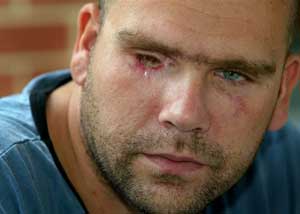Jason Pepper
DAV Charitable Service Trust > Learn More > Jason Pepper

For Jason and Heather Pepper, the Army was a hometown and a way of life. Heather, a military brat, had lived in Germany most of her life. Jason, a staff sergeant, had spent the majority of his 10-year military career there. Their daughter, Naomi, had never lived in the United States. No one in the family could imagine a different lifestyle.
But that all changed on May 7, 2004. Jason had been deployed to Karbala, Iraq, as a member of the 16th Armored Engineer Battalion. While on patrol, he and his men were ambushed in their armored personnel carrier on the outskirts of town. “Bullets were flying everywhere,” recalls Jason. “I looked up and saw a RPG (rocket-propelled grenade) being fired at us. I pushed my guys out of the way and it seemed to go over the top of us. I got up and went to return fire.”
That’s when Jason heard, and felt, the blast.
“I thought, ‘Oh my God, I’m dead,’ and then the only thought in my mind was that I was never going to see Naomi and Heather again.”
And he wouldn’t.
An improvised explosive device in a nearby tree had been command-detonated. Jason took the brunt of the blast that destroyed his eyes, shattered his right forearm, and mangled his left hand.
He would receive a Bronze Star with a device for valor for saving the lives of his men. But his life, as he knew it, was over.
“We knew nothing was ever going to be the same. But we had no idea what was next,” Heather recalls. “We felt like we were being thrown out to the civilian world and we weren’t ready.”
After being medically evacuated from Iraq, Jason was sent to Landstuhl, Germany, and finally to Walter Reed Army Medical Center. It was there that the family made its first contact with DAV.
“If it weren’t for the DAV, we’d feel completely lost,” Heather says. “Our country needs the DAV to answer questions and help the veterans and families who’ve sacrificed so much.”
Through the DAV Charitable Service Trust, Jason can take advantage of rehabilitation programs based on his specific needs. From transportation to VA medical centers to therapeutic programs, the DAV will be there to help Jason and other profoundly injured veterans adjust to new lives.
“Every day is different,” Jason says. “Every day has new situations and a new challenge to face. I’ve moved six times since my injury – from center to center. I’m learning. I feel my way around and mentally map things out.”
Jason was medically retired from the Army on January 1, 2006. And now, he says he’s beginning to “see” a new life taking shape. He and his wife settled into a new property in Tennessee. They’re planning to buy a few acres and raise horses. “It’s good to be out of the hospital for a while and to actually be able to make plans. There’s a lot I want to do. And a lot of things ahead for us,” he says.
GIVING DISABLED VETERANS A NEW PERSPECTIVE ON LIFE
For people like Jason, veterans of previous conflicts, their families, and homeless veterans, the DAV Charitable Service Trust is constantly seeking new and innovative ways to make a difference.
The Trust has provided more than $58.7 million in support for projects that provide direct assistance to sick and injured veterans and their families. It invests in the future by evaluating and addressing the needs of veterans who are leaving the battlefields of Iraq and Afghanistan.
Funds to support the DAV Charitable Service Trust result from the generosity of donors through workplace campaigns like the Combined Federal Campaign, United Way, and other workplace giving programs across the country.
“We count on the public’s support to give our veterans the vast array of support and rehabilitation the Charitable Service Trust offers,” says Richard E. Marbes, a service-connected amputee and Chairman of the DAV Charitable Service Trust. “We need their help to give our veterans the vision of hope they’ve earned and deserve.”






